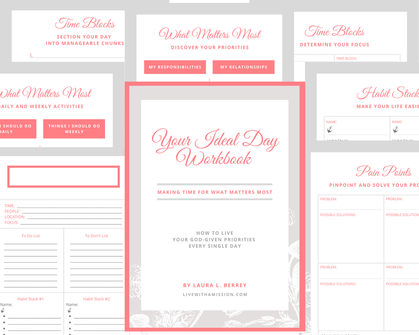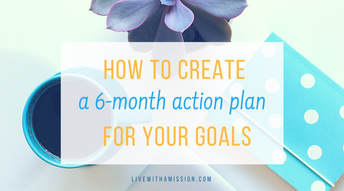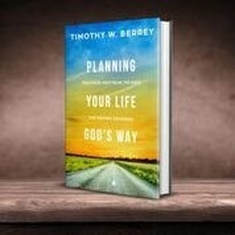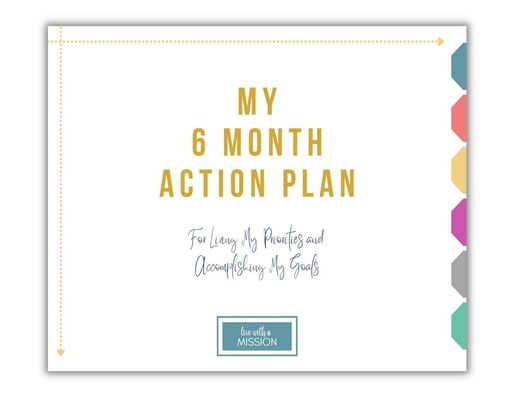|
Making Time for What Matters Most I recently did a session at the KCEA conference on Creating Your Ideal Day: Making Time for What Matters Most.
The Ideal Day Workbook enables you to walk through this process discovering your God-given priorities, blocking out your day, and solving the frustrations that confront you in your daily living. It enables you to hone your focus: to know what to do and what not to do during each section of your day. If you are interested in creating your own Ideal Day, you can download the Workbook here. See then that ye walk circumspectly, not as fools, but as wise, redeeming the time, because the days are evil. Wherefore be ye not unwise, but understanding what the will of the Lord is. --Ephesians 5:15-17 Some days are just plain overwhelming, aren't they? You wake up to a demanding day with a task list that would make a Navy SEAL during BUD/S training look like they are on vacation. You probably always feel busy, in one way or another, but on those crazy days, you feel insanely overworked. You spin from one chore to the next, sometimes not able to quite finish it before you have to drop it and move on to the next. How can you handle days like that? How can you live your crazy-busy day with passion, purpose, and productivity? How can you be happy and find joy in the midst of these kinds of days? How can you plan your day God's way? I suggest that, on days like this, you take a ten-minute time out to stop and look over your task list, considering each item based on the nature of its consequences. What you will find is that there are tasks that you can leave undone and others that you absolutely must not. The key is to discern the difference. But how can you do this? How To Wisely Prioritize Your To-Do List1. Ask the Holy Spirit for wisdom. Ephesians 5:15-18 reminds us that we need to live wisely, redeeming the time because the days are evil, and that the only way we can possibly accomplish this challenging task is if we understand what the will of the Lord is. For this, we need to be filled with the Spirit and consciously living our lives under His control so that we won't waste our days under the control of things which cause dissipation. When we understand the will of the Lord, we gain all kinds of wisdom about our priorities for the day and for our lives. 2. Consider the consequences of the things we do each day. One of the ways we can live wisely, understanding the will of the Lord, is by contemplating our list of tasks in the light of their impact on our lives, both temporal and eternal. Here is a simple rubric for determining which tasks should get priority based on the consequences of leaving them undone. A--Absolutely must be done. Awful consequences if left undone. B--Better do. Bad to mild consequences if left undone. C--Could do. But could skip or procrastinate. No real consequences if left undone. D--Delegate. This task doesn't require you. E--Eliminate. Not essential to your life. Extraneous. In your mind, you should draw a clear line of demarcation between A-B-C tasks and D-E tasks in your mind. E tasks and D tasks don't really need to be done, or at least not by you. E tasks could actually harm you if you do them. D tasks don't help you. Next, think of the A-B-C tasks as "good-better-best." C tasks are good and if you are able to do them, that's fine. But you want to postpone them until your other work is done. B tasks are better. By all means, do them whenever possible. A tasks are the best things to focus on. You MUST do these things. Leaving them undone can bring tragic consequences. Many of these bring tragic spiritual consequences in your life or in others' lives. For busy moms, it is helpful to think these things through in advance. Some things are always A tasks. Other things will always be E tasks. But often the tasks on our to-do list change rank on us. Putting gas in the car when the tank is half full is probably a C task for that day. It might even be an E task, depending on what else is on your list. But putting gas in the car when you are on an eighth of a tank has just moved up to become an A task. It is helpful even to rank your morning and evening routine tasks by using these preset labels. In my morning routine, I have things like Bible reading (A task), Exercise (B task), Overseeing kids' chores (B task), and Reading a good book (C task). When my morning routine gets shortened because of time constraints, I know exactly which tasks to treasure and which to toss into the harbor like over-taxed tea. This is supremely helpful. Take a look at your to-do list for the day. What can you do to eliminate, delegate, and procrastinate in order to bring your focus back to the things you truly need to do? 3. Remember the One Needful Thing. And please, remember the words of our Lord to Martha when she asked Him to encourage Mary to stop sitting at His feet listening to Him and instead come help her serve: "Martha, Martha, thou art careful and troubled about many things: but one thing is needful: and Mary hath chosen that good part, which shall not be taken away from her" (Luke 10:41-42). More on life management:
Living a life of passion, purpose, and productivity requires us to plan, plan, plan. What does your ideal planner look like? Discover your ideal planner. . .I've spent hours in bookstores and office supply shops looking for the ideal planner. I love planners. I seem to think that if I can just get my grubby little hands on the right planner, I would accomplish more and maybe not forget important things like, "Oh, yeah, I'm teaching today at five." Here's the problem with that kind of thinking: the ideal planner isn't a planner. It's you. Whatever system you use, you are the planner, not the paper and pen or the app. You are the one who calls the shots, defines the priorities, schedules appointments, and juggles everything to make it fit. You are the one who makes it or breaks it by your self-discipline or lack thereof. And you are the one who will, ultimately, stand before God and give an account for the way you spent the time He gave you: the minutes, hours, days, weeks, months, and years. You are the ideal planner, regardless of whatever system you use. That's an important piece of information, because it means you don't have to wait to get started. You can start today with a piece of paper or a 3 x 5 index card or the back of your grocery store receipt. Obviously, the more orderly you are with your planner, the more likely you are to use it. If you lose your receipt, you lost your plan. And that's a problem. But if that is all you have, that's a good place to start. The first thing on the back of the receipt could be "find or buy a notebook for planning." It doesn't have to be a three-hundred dollar, red-leather gold-zippered cover with a fifty dollar, complete planning system inside. In fact, I recommend you start small and cheap and figure out what kinds of systems you would really use before you invest. Some will be overkill for your life, others will prove to be, well, disappointingly underwhelming. So give it time. The important thing is that you need something that lets you plan on many different levels: the daily, the weekly, the monthly, the yearly, and even the long term. Most planner systems do this, but each has its own unique spin on it. And you are unique, so your brain may not mesh well with some planners. For instance, the first thing I look for in a planner is the layout of the days of the week. I like having them all on one spread, but I hate it when they are just blocked off in squares. I want columns, preferably with hourly lines for appointments and a section at the bottom for extra things. I won't use squares, they don't fit my brain. If I can't have columns, I'll just use a normal monthly calendar and live with the mess. You may be the opposite: you may hate the columns and hourly slots and thrive on big blank squares. You go, girl! You can dominate your day that way, and that's great. But, whatever planner you end up with, whether it is complicated or simple, expensive or cheap, cute or chic, leather or pleather, please remember that the ideal planner is actually you. MORE ON PLANNING:
How are you doing with your goals for this year? Have you done a mid-year review? Did it leave you energized and excited over all the goals you met? Or do you find you are behind? Here is one way to create a strategic 6-month action plan that will help you meet your goals for this year. . . no matter how far behind you might be. I love new beginnings. I adore the first day in January. While many people are sleeping off the effects of New Years' Eve parties, I'm generally up early with my notebook and Bible. Because I love the idea of a new year, new goals, new accomplishments, I don't want to waste a single moment of my bright new start. Maybe this is why I also love mornings. Each glorious sunrise brings the promise of a new day, a new chance. When my husband played golf (for the first and only time) a few years ago, he brought home a new word. Mulligan. A Mulligan in golf terminology is a do-over. A second chance. I think that's how I feel about fresh starts, so I try to notice and celebrate them. Today is the fifth of July. But before the month of July had begun, I had already prepared for it. July is a great time to issue yourself a fresh start! The first of July ushers in the first day of the second 6 months of your year. About time, in my mind, for a Mulligan. THE 6-MONTH ACTION PLANThis year I definitely needed a Mulligan. My husband and I laid out our goals for the year--as usual--in January, but even at that time, I already could foresee that the first six months of my year would be a matter of simply clinging to the edge of my obligations with my fingernails. There would be a lot of barely getting by and not much in the realm of actual progress. Not that I'm complaining! For a mom like me, most of life lies in the sacred mundane: laundry, homeschooling, church activities, supporting and helping my husband, sweeping, washing dishes, cooking, nurturing my children. I'm one of those blessed women who always wanted to do exactly what I am doing, and all those things are a part of that life. I'm grateful for this. I love these things. But there are a few things I feel a need to add to that mix. These are some of the things that ended up on my goals list for the next 6 months.
Which, as I was saying, I updated as of July 1. My husband and I read back over our goals, discussing which ones we completed, which ones we no longer felt a burden for, and which ones we needed to start focusing on again. And then I made a more complete goals list for myself in which I delineated my biggest priorities and the focus areas of each one, along with my "next step" in that area and a list of small steps to take to complete the project or move forward with my priority. It's a simple process, breaking down your priorities into smaller, manageable goals. But many people don't do it. They see a goal, like "Clean out the garage," and they envision a huge project that requires three weeks to accomplish. So they never move forward on it. CHUNK IT DOWNBut that's not the way to accomplish a goal or a project. The way to accomplish a project is to chunk it down into manageable sections and then break it down further until you have tiny, concrete, 5-10 minute mini-projects. Then you can move forward, absolutely clear on what the next step is and when you should finish it. For instance, as I said, one of my priorities is reading. I want to read through the Bible twice this year, taking notes and making it a meaningful journey. That's a big task, and not one that can be accomplished all at once in a block of time. Instead, I have to chunk it down into several small steps.
The hard part is the "two books a month" that I want to read in addition to the Bible. Which books? How do I get them? When do I read them? It's easy to fall into analysis paralysis and never actually take the first step toward your goal. How many times have we all done that? So, when I decided to make reading a goal, my first mini-goal was to pick the 12 books I want to read during the rest of this year and collect them. I chose to pick 12 that I already owned, most of which I haven't yet read. I gathered them, made my list, and put them by my bed on a shelf that I stole from our living room. (I needed it more. Sorry.) Then I challenged myself to finish each book in two weeks. So at the beginning of each two week block, I have to look at the Table of Contents to see how many chapters there are, so that I know approximately how many I need to read each day to finish within that time. COMPARTMENTALIZE YOUR TIMEThen I put a time slot into my day when I would devote myself to reading that book. Because there is always work to be done (floors to be swept, laundry to be folded, tests to be graded), if I don't compartmentalize my day somewhat, homeschooling and housework will eat my whole entire schedule. Swallow it whole. Gobble it down, and leave no leftovers for me or anything else. So a major task in accomplishing our goals as women with a mission is to compartmentalize our time. I do this by making myself a time budget, telling myself that from this time to that time I don't do housework or homeschooling (unless my ox is in the ditch). From this time to that time, I only focus on these other important tasks. This time-compartmentalization is an extremely important part of my goal setting process. However, I have found that accomplishing my goals, even after chunking them down and picking the next step and compartmentalizing my time, is still a challenge to follow through with. It seems like the urgent things of life always crowd out the important things of life. So I sometimes need accountability. The problem is that accountability opportunities don't usually just magically appear. Sometimes you have to create them. CREATE ACCOUNTABILITYI look for ways to create accountability in several places. Myself I hold myself accountable on paper. Somehow, the act of acknowledging on paper that I did (or didn't do) the thing I am committed to doing makes it more tangible and more grave an offense if I fail. I can look back and measure myself this way. I can self-edit: "Oops. . . I forgot my vitamins three times this week. What do I need to do to make sure I remember?" My husband We share our goals with each other. We don't crack any whips over each other's heads, but we challenge each other and encourage each other. When we know the going is tough, we try to help the other person accomplish their goals: "I'll watch the kids this morning, honey, so you can finish that project." Not only are we spouses and best friends, we are awesome accountability partners. Friends and Relatives Sometimes I need that whip-cracker in my life. I love it when I have a friend or a family member who is also working on a goal. It doesn't even have to be the same goal! You just need someone who is working toward something who also wants accountability in their life. You can mutually benefit one another. (Quick tip: kids make great whip-crackers. They love checking up on their parents.) A Coach If you are really struggling with something and need to take it to the next level, you may want to find someone who can help you on a more formal basis. This is the idea behind a personal fitness trainer or a counselor. Coaches are experts in the field you want to improve in. Finding a coach could mean taking a class, signing up for a seminar, or registering for a conference. It might mean hiring someone to help you, but it doesn't have to. Maybe it means finding a mentor who is willing to take some extra time with you. How are you doing with your goals for this year? Do you need to take some time to re-evaluate where you are and how you are doing? |
AuthorLaura Berrey and her husband Tim are missionaries with Gospel Fellowship Association. They share a passion for missions which has taken them to several countries in Africa, Asia, and Europe. They currently minister in the Philippines. Archives
September 2020
Categories
All
|











